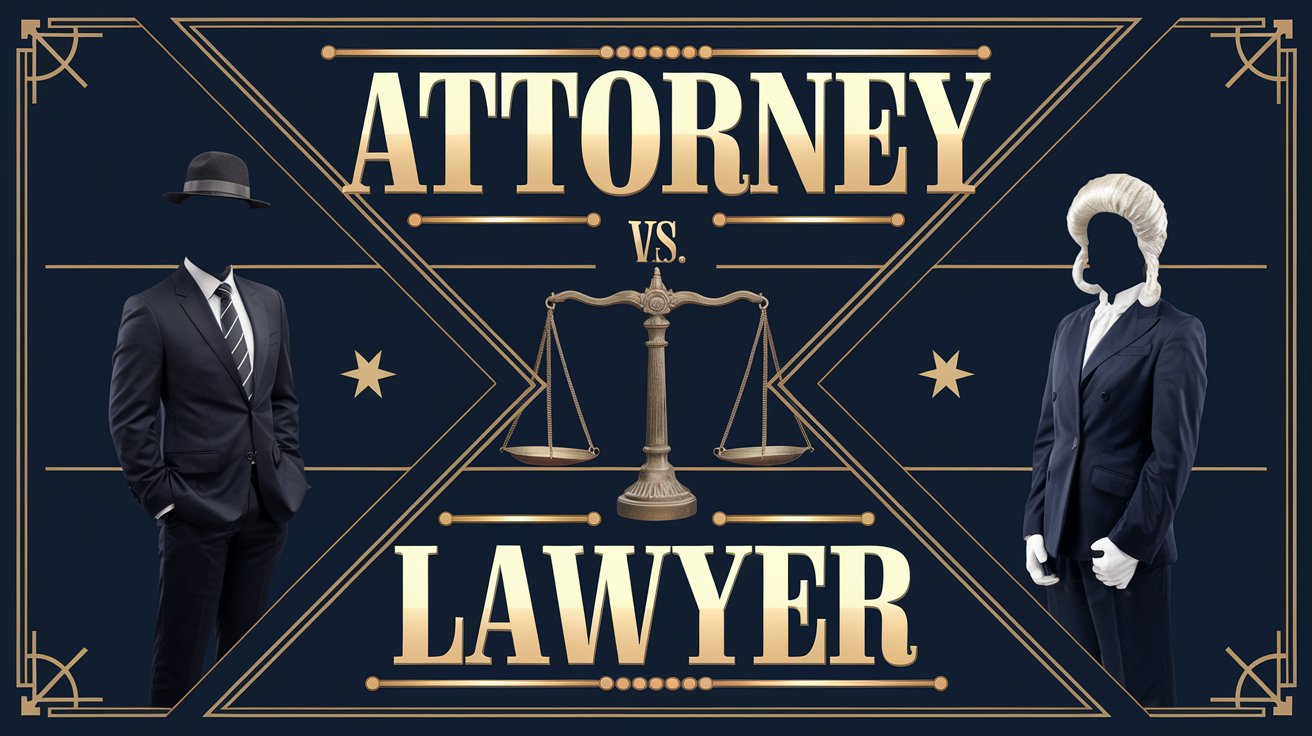When it comes to legal matters, choosing the right professional to represent you is crucial. The terms “attorney” and “lawyer” are often used interchangeably, but they carry distinct meanings that can have important implications depending on your legal needs. Understanding the differences between an attorney and a lawyer is essential for making an informed decision when seeking legal assistance. This blog will explore the key distinctions between an attorney and a lawyer, their respective roles, and which may be better suited to your specific legal situation.
Defining the Terms: Attorney and Lawyer
A lawyer is someone who has completed law school and holds a legal degree, typically a Juris Doctor (JD). Lawyers are trained in the law and can provide legal advice on a wide range of topics. However, not all lawyers are licensed to practice law in a court of law. To become a licensed practitioner, a lawyer must pass the bar exam in their respective jurisdiction. Once they pass the bar, they are authorized to represent clients in legal matters, including appearing in court, drafting legal documents, and providing comprehensive legal counsel.
An attorney, on the other hand, is a lawyer who has passed the bar exam and is legally authorized to practice law in a specific jurisdiction. The term “attorney” is short for “attorney-at-law,” signifying that they are legally empowered to act on behalf of their clients in various legal capacities. All attorneys are lawyers, but not all lawyers are attorneys. Attorneys have the added responsibility of representing clients in legal proceedings, making them a crucial asset in cases that require courtroom advocacy.
Differences Between an Attorney and a Lawyer
While the terms “attorney” and “lawyer” are often used interchangeably, there are important distinctions between the two. These differences can impact the type of legal representation you receive and the scope of services provided.
A lawyer is an individual who has received legal education and possesses a legal degree. Lawyers can offer legal advice, draft contracts, and conduct research on legal issues. However, if they have not passed the bar exam, their role is limited to advisory and non-court-related tasks. They cannot represent clients in court or engage in litigation on behalf of their clients.
An attorney, being a licensed lawyer, has successfully passed the bar exam and obtained the necessary credentials to practice law in a court of law. Attorneys are empowered to represent clients in legal matters, file lawsuits, negotiate settlements, and advocate for clients in court. Their ability to take cases to trial, engage in litigation, and handle complex legal proceedings sets them apart from non-licensed lawyers.
These distinctions are important when considering which professional to hire for your legal needs. The scope of your legal issue and whether it involves court representation or litigation will determine whether an attorney or a lawyer is the better choice.
Choosing Between an Attorney and a Lawyer
When deciding whether to hire an attorney or a lawyer, the nature of your legal issue is the primary factor to consider. If your legal matter requires representation in court, the filing of a lawsuit, or negotiation of a legal dispute, an attorney is the appropriate choice. Attorneys have the authority to act on behalf of clients in these situations, offering the full range of legal services required for successful resolution.
If your legal needs are more advisory in nature, such as seeking legal advice, drafting contracts, or ensuring compliance with regulations, a lawyer who is not licensed may be sufficient. Lawyers who focus on non-litigation work often provide valuable services for businesses, individuals, and organizations that require legal guidance but do not anticipate going to court.
Another important consideration is the level of specialization required. Attorneys often have more experience in specific areas of law, such as criminal defense, family law, or corporate law. Their courtroom experience and expertise in litigation can be invaluable in cases where legal strategy and advocacy are critical. On the other hand, lawyers may have expertise in areas like contract law, intellectual property, or regulatory compliance, making them well-suited for non-litigation tasks.
The cost of legal representation can also vary between attorneys and lawyers. Attorneys, due to their licensing and ability to represent clients in court, may charge higher fees than non-licensed lawyers. If your legal issue does not require litigation or court representation, hiring a lawyer may be a more cost-effective option. However, for cases with significant legal risks or high stakes, the added cost of hiring an attorney may be justified.
The Role of Licensing and Credentials
Licensing and credentials are key factors in distinguishing between an attorney and a lawyer. In the United States, attorneys must pass the bar exam in the state where they intend to practice. The bar exam is a rigorous test of legal knowledge and skills, and passing it grants the attorney a license to practice law. This license is issued by the state bar association, and attorneys must adhere to the ethical standards and continuing education requirements set by the bar.
Lawyers who have not passed the bar exam do not hold a license to practice law in court. While they may have a deep understanding of legal principles and provide valuable advice, their inability to represent clients in court limits the scope of their services. It is important to verify the licensing status of any legal professional you are considering hiring, especially if your case involves court proceedings or litigation.
In some cases, the distinction between an attorney and a lawyer may be less relevant, particularly in jurisdictions where the terms are used interchangeably. However, understanding the role of licensing can help you make an informed decision when selecting legal representation.
Common Misconceptions About Attorneys and Lawyers
There are several misconceptions about the roles of attorneys and lawyers that can lead to confusion when seeking legal assistance. One common misconception is that attorneys are inherently superior to lawyers. While attorneys have the added qualification of being licensed to practice law in court, the effectiveness of a legal professional depends on their expertise, experience, and suitability for the specific legal issue at hand.
Another misconception is that all attorneys and lawyers perform the same tasks. In reality, the scope of practice can vary significantly between the two. Attorneys are often involved in litigation, trial work, and dispute resolution, while lawyers may focus on advisory roles, contract drafting, and legal research.
It is also important to note that while all attorneys are lawyers, not all lawyers are attorneys. The term “attorney” signifies that the individual has passed the bar exam and holds a license to practice law, granting them the authority to represent clients in legal matters. Lawyers, on the other hand, may or may not have this authority, depending on whether they have obtained their license.
When to Hire an Attorney
There are specific situations where hiring an attorney is the best course of action. If your legal matter involves litigation, such as a criminal case, divorce, or personal injury lawsuit, an attorney’s courtroom experience and advocacy skills are essential. Attorneys are equipped to handle the complexities of trial work, negotiate settlements, and represent clients in all aspects of the legal process.
Similarly, if you are facing a legal dispute that may escalate to court, hiring an attorney ensures that you have a qualified professional to advocate on your behalf. Attorneys can also provide strategic advice, assess the strengths and weaknesses of your case, and develop a plan for achieving a favorable outcome.
For businesses and individuals involved in high-stakes legal matters, such as mergers and acquisitions, intellectual property disputes, or regulatory investigations, an attorney’s expertise is invaluable. Their ability to navigate complex legal frameworks, negotiate with opposing parties, and represent clients in court provides a level of protection and assurance that is critical in these situations.
When to Hire a Lawyer
If your legal needs do not require litigation or court representation, hiring a lawyer may be the right choice. Lawyers can provide valuable services such as contract drafting, legal advice, and compliance guidance. For businesses, lawyers can assist with regulatory matters, intellectual property issues, and corporate governance without the need for courtroom intervention.
Individuals seeking legal advice on estate planning, tax matters, or real estate transactions can also benefit from a lawyer’s expertise. Lawyers who specialize in these areas can help you navigate legal requirements, draft necessary documents, and ensure that your interests are protected.
For smaller legal matters or situations where cost is a consideration, hiring a lawyer who is not licensed to practice in court can be a more affordable option. However, it is important to recognize the limitations of a lawyer’s role and ensure that their services align with your legal needs.
Conclusion: Making the Right Choice
Choosing between an attorney and a lawyer depends on the nature of your legal issue, the level of expertise required, and whether court representation is necessary. Attorneys, with their ability to practice law in court, are best suited for cases involving litigation, disputes, and complex legal matters. Lawyers, who may not hold a license to represent clients in court, can provide valuable advisory services, contract drafting, and legal guidance for non-litigation needs.
Understanding the distinctions between these two roles empowers you to make an informed decision when seeking legal representation. By carefully considering your legal needs, evaluating the experience and credentials of the professional, and assessing the cost implications, you can choose the right legal professional to achieve the best possible outcome for your case.
In the end, the choice between an attorney and a lawyer should be based on your specific circumstances, the nature of your legal matter, and your confidence in the professional’s ability to meet your needs. Whether you require the advocacy of an attorney or the expertise of a lawyer, selecting the right legal representation is key to navigating the legal system with confidence and success.





